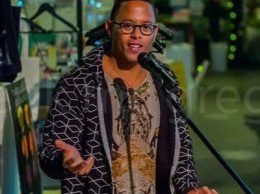Help for "The Help"
By Gwendoline Y. Fortune, Ed. D.
Within twenty-four hours, friends sent three critical reviews of “The Help,” a film that is garnering high praise, boosting sales for the book from which it was adapted, and blasting the box office. I am very happy that this film that I will not pay to view, as I would not buy and read the novel, is receiving a particular kind of scrutiny. I am not narrow-minded or prejudiced. I am not infuriated by “The Help.” Instead, my mental and emotional state is one of boredom. Ho hum. If I hear of one more book or film depicting the great love a white American received from their “Mammy”—oops, sorry, I mean their “maid”—I will have no choice but to turn up the volume of a Paul Robeson recording to the highest possible level.
So, why am I happy that the film has been made? It is because I wonder if this presentation of maid-ward relationship will, finally, stir millions of people of color to honestly react to this continued outpouring of the same story, with modest variations. Art is supposed to be creative, offering something different, or at least nuances on a theme, that says something new. More years ago than I will write here, I was a fifteen-year-old freshman at Bennett College for Women in Greensboro, North Carolina. I sat in my dorm room reading a book for an English assignment. I don’t remember the assignment, yet I recall looking up from the book and saying to the empty room, “Every story I read about my people we are barefoot, pregnant and in the field. There are hundreds of girls on this campus and we all speak English and wear shoes.”
Decades later, recently divorced and with my children in college, my youngest son said that it was time to write my stories. He knew that his father and I had grown up in the South, and that his life, in Illinois, was considerably different than ours. He had been taken south to visit family during the summers as he grew up. While I didn’t know what “stories” he specifically meant for me to write, I decided to take on the task.
Heeding my son’s suggestion, I researched my childhood days by going to South Carolina, spending months in the mid-sized city of Anderson, taking notes of memories and sites. I drove around town, or lay in bed at night, reminiscing. Back in the mid-west, two years later, I offered my “coming of age” novel for publication.
The result was a twelve-year odyssey of seeking an agent and publisher. One publisher wrote to my agent, “She doesn’t write the black experience.” After, my agent was able to “sell” the story through a lackluster review by someone, I am sure a young white male, who referred to my personal account as “a subplot of an interracial love affair.” This was the only plotline the reviewer could read in my novel Growing Up Nigger Rich, a tale of personal, social and historical significance—all because the title led him to expect something salacious and sexual.
Twelve years after I finished an acceptable draft of my manuscript, my agent was able to place it with a small publisher. I found that I still could not breathe easily about the release, for the work was just beginning concerning the strategy for the book’s promotion. My publisher did not know how to market my work, nor did the media gate-keepers know what to do with the unusual content. A black woman with a maid, whoever heard of such a thing, and long before the days of black celebrity bling-bling? Oh no. Many of our friends had “help.” We traveled through the South, on vacations and professional occasions with our parents. Despite our financial means, from South Carolina, north to Washington, DC, and again south to New Orleans, we couldn’t stay in hotels. Instead, we stayed with any number of friends who always had “room.”
Unlike the maid in “The Help,” with her white “chile,” I was a Negro child with a Negro maid, as well. My family had a series of maids, as did many of our friends. My parents were medical professionals, in South Carolina. They and their similarly situated friends had maids. Some mothers were teachers or nurses, or, in my family, pharmacists. Others did not work outside of the home, yet had “help.” My father always called our housed lady, “The Cook.” I remembered several of our maids: Louise, Julia Mae, Frances, and Mrs. Smith, the first in my memory who came to cook, clean and care for the children when I was four years old and upon my sister’s birth. I did not change into a facsimile of Shirley, the white girl who lived across the street from our house. There were others, whose name I have forgotten. Julia Mae and Louise were my favorites. I lost contact with Julia Mae, but reconnected with Louise when I began to write. We remained friends until she died.
The realization did not come to me for some time that, indeed, my father’s mother had “help.” My grandmother was the wife of a small college president, and part of the tuition costs for some of the students had been to help the president’s wife. I found a page from the 1900 census at the Atlanta archives which included my grandfather, grandmother, and their two children at the time, including my father who was only ten months old. Listed on the census is name of the live-in “housekeeper.” I asked Daddy if he remembered the name of the woman listed in the census. “No,” he responded. Instead, he named another housekeeper, one, I guess, that he liked a lot, much as I remembered the women employed in our immediate household, Julia Mae and Louise.
I write from that history. I am accused of not being black while, one after another white women write of their memories of their maids, and the effects these women had on them. Does black have to mean, only and always, being “The Help”?
 Gwendoline Y. Fortune is a native of Texas, with paternal roots in the Carolinas, Gwendoline Alpha Young Fortune lived most of her life in Illinois. She is an educator, a classically trained soprano, and has traveled on five continents. Gwen wrote regular columns for suburban Illinois and North Carolina newspapers and has been guest columnist for magazines and journals. Her published novels are, Growing Up Nigger Rich (2002) and Family Lines (2003), by Pelican Publishing with endorsements from authors Lee Smith, George Garrett, Joanna Catherine Scott and Judge Abner Mikva. Growing Up Nigger Rich is listed in the Yearbook of Literary Novels, 2002 as “Outstanding.” Dr. Fortune is an essayist, workshop leader and speaker on writing and spiritual development. Her third novel, Weaving the Journey: Noni and the Great Grands, Avisson Press, Inc, is a 200 year saga of an African American family across two hundred years.
Gwendoline Y. Fortune is a native of Texas, with paternal roots in the Carolinas, Gwendoline Alpha Young Fortune lived most of her life in Illinois. She is an educator, a classically trained soprano, and has traveled on five continents. Gwen wrote regular columns for suburban Illinois and North Carolina newspapers and has been guest columnist for magazines and journals. Her published novels are, Growing Up Nigger Rich (2002) and Family Lines (2003), by Pelican Publishing with endorsements from authors Lee Smith, George Garrett, Joanna Catherine Scott and Judge Abner Mikva. Growing Up Nigger Rich is listed in the Yearbook of Literary Novels, 2002 as “Outstanding.” Dr. Fortune is an essayist, workshop leader and speaker on writing and spiritual development. Her third novel, Weaving the Journey: Noni and the Great Grands, Avisson Press, Inc, is a 200 year saga of an African American family across two hundred years.
Her awards include a Blumenthal Readers and Writers from the North Carolina Writers’ Network, QBR-Poets and Writers Toni Cade Bambara Fiction Contest. She has delivered papers at Meredith College in North Carolina, The African American Association of Historical Research and Preservation Conference at Seattle University, and elsewhere.
Dr. Fortune lives in Gainesville, Fl where she continues to write and present. Her thirteen-program radio/pod series, “We do it all, Classical Music composed and performed by people of African descent,” comes from a life as student and performer.
Dr. Fortune’s goal is to communicate a “different” perspective on American life, one that differs from the stereotypical model of people of color. Her experience as a world citizen, a reflection of African-European-Indigenous American heritage, equips her for this role. She has three adult sons and three granddaughters.





72 Comments